Al-Zaytouna Centre for Studies and Consultations held on 12/1/2022 the panel discussion, “The Palestine Issue: Strategic Evaluation 2021 – Strategic Assessment 2022,” where participants included a group of researchers, scholars, specialists and those interested in the Palestine issue.
| The proceedings of the panel discussion are available at al-Zaytouna’s YouTube channel: Click here |
The first session, moderated by ‘Atef al-Joulani, included discussions concerning the internal Palestinian scene, the internal Israeli scene and the peace process.
Concerning the internal Palestinian scene, Sari ‘Orabi talked about the continuation of the crisis of the Palestinian national project, and the absence of a national program that confirms the fundamentals and manages the current stage. He reported about the continued deterioration of the Palestine Liberation Organization (PLO) and its institutions and the continued erosion of the Palestinian Authority (PA) and its transformation into a functional tool. He said, “We have recently noticed that the Palestinian Authority used Fatah to confront the Palestinian masses. This is what we found after the killing of Nizar Banat, and thus by disrupting the PLO, the Palestinian Authority is evolving into a totalitarian security regime.” However, he added, “This does not absolve the rest of the Palestinian national factions and forces from their national responsibilities.”
‘Orabi expected the continuation of the crises of the national project and the official Palestinian institutions, as long as the same mentality continues to lead them. He also expected an increase in the security behavior of the PA. He stated that “during the coming period, the Palestinian Authority will increase its reliance on external support, specifically the Israeli one, and the security nature of the relationship with Israel will increase, and this is a dangerous indicator.”
Ziad Bheis, whose paper entitled, “Jerusalem: Developments and Possible Prospects,” said that the occupation has continued its endeavor to resolve the identity of Jerusalem, with unprecedented US cover, and a state of Arab-Islamic weakness and fragmentation, while there is a significant increase in the pro-normalization positions. Israel has exploited the COVID-19 pandemic to get rid of the public’s will and impose new realities on al-Aqsa Mosque and the rest of the holy sites. Israel has continued to demolish the homes of Jerusalemites, and to impose Jewish rituals in al-Aqsa, while seeking to acquire legitimacy through Israeli courts. Bheis expects that Israel will advance on three fronts in Jerusalem. It will attack the symbols of sovereignty in Jerusalem, besiege the Islamic movement in the 48 territories, and end the role of the Fatah section in Jerusalem, which was the only organization active in the city, in addition, it will approve more Judaization plans that could change the historical aspect of Jerusalem. Bheis expects that Israel, in the next two years, will continue to intensify settlement building in Jerusalem, impose biblical rituals at al-Aqsa Mosque, which would lead to an escalation of Palestinian popular uprisings.
Dr. Muhannad Mustafa discussed the developments of the Israeli internal scene in 2021 and its possible prospects for 2022. He saw that the Israeli society is developing to be more extreme, more religious and nationalistic, and that the right-wing movements dominate the government and the Israeli political scene. He added that the Israeli political system is confused and instable, and it has difficulty in making important decisions as a result of the multiple general elections and the inability of large parties to form stable governments. As for the latest Israeli coalition government (June 2021), he said that despite the fact it is not homogeneous, the participating parties are so far keen on its continuation, especially since Benjamin Netanyahu is still in the political scene.
Afterwards Hani al-Masri discussed the peace process and the Israeli annexation plans in 2021, saying that the peace process has reached a deadlock, and that there is no talk about reviving the peace process, since there is Palestinian confusion, and the Arab conditions cannot pressure Israel to launch a real peace process.” Al-Masry explained the conditions inside Israel concerning the peace process, stating that “the large majority reject the peace process, and even reject the establishment of a Palestinian state. This issue has Israeli consensus. They talk about the continuation of futile talks, whereas what is offered to the Palestinians is a security and economic offer, until further notice.” He added that the concept of economic peace cannot be a political or a peace plan, and that based on that concept, former Prime Minister Benjamin Netanyahu and former US President Trump tried to resolve the conflict rather than solve it. As for the PA leadership, he said that although it rejected previously the concept of economic peace, however, after Trump lost the elections, the PA accepted it. Al-Masry stated that the Israeli occupation and the US administration are seeking to transform the PA into an “Antoine Lahd’ model, and that the Palestinians can and must prevent it.
In the second session, moderated by Prof. Dr. Ahmad Sa‘id Nufal, participants discussed the developments of the normalization with Israel, Iran and the Palestine issue, Turkey and the Palestine issue, in addition to the international and US influence on the Palestine issue.
Ashraf Bader introduced his paper on the developments of the normalization with Israel and its possible prospects. He said that due to Arab weakness and fragmentation, US pressure led by former US President Trump, and his quest to implement the “Deal of the Century” plan, normalization with Israel made significant progress with four Arab countries; the UAE, Bahrain, Morocco and Sudan. However, the Arab nations have rejected these moves. Bader said that the normalization wave will slow down, because the normalizing countries took many normalizing steps, and there is nothing left to accomplish. Bader analyzed also the policies of the countries surrounding Israel, specifically Egypt, Syria, Jordan and Lebanon.
Prof. Dr. Talal ‘Atrissi, who discussed “Iran and the Palestine issue: Developments and Possible Prospects,” said that Iran has continued to support the resistance action financially, militarily, and in the media, which was appreciated by the resistance forces. The Iranian position that refuses to recognize Israel has continued, a position that is likely to continue in the foreseeable future.
Dr. Sa‘id al-Haj, who discussed the developments of Turkey and the Palestine issue, and the possible prospects, said that Turkey has maintained its political support of the Palestine issue, on the basis of a two-state solution, and maintained a good relationship with the leadership of the PLO and the PA, and with Hamas, hosting many of their cadres. Turkey has also maintained its strong criticism of Israeli practices, however, al-Haj believes that there is a Turkish-Israeli desire to improve bilateral relations, although they are not expected to develop significantly, because they are based on interests and necessities. For Turkey has temporary needs related to its economic situation and the 2023 elections, requiring calm relations with a number of regional countries.
Prof. Dr. Walid ‘Abd al-Hay discussed the international influence, especially that of the US, on the Palestine issue and the possible prospects. He pointed out that in 2020 and 2021 the traditional role of the Quartet and the UN has continued by not accepting most of the Israeli policies in the 1967 occupied territories, and supporting the cease-fire efforts after the Sword of Jerusalem battle. The European, Russian, Chinese and Japanese policies towards the Palestine have continued, by adhering to the resolutions of “international legitimacy,” but without taking any actual concrete measures against the Israeli policies, or improving their relations with the Palestinian side. He noted that the global popular sympathy with the Palestine issue has grown, and the financial support for the PA and UNRWA has declined. ‘Abd al-Hay expected that international pressure, especially that of the US, will continue on the resistance movements, especially in Gaza, and that, during the next two years, there would be no drastic changes at the international level with regard to the Palestine issue, especially with the continued preoccupation of the international community with the international crises in Ukraine and other regions.
There were many important interventions that enriched the discussion, including those of Wa’el Al-Mabhouh, Hussain al-Qazzaz, Saqr Abu Fakhr, Amin Hoteit, Ahmad Sabahai, Walid Muhammad ‘Ali, Fouad Bseiso, Kamel al-Hawwash, Hisham Tawfiq, ‘Abdul-Jabbar Sa‘id and Faruq Tayfur participated.
At the end, Prof. Dr. Mohsen Mohammad Saleh thanked the participants and valued what was discussed, hoping that it would contribute to serving the Palestine issue and those working for it. He added that the region is passing through important milestones, being reshaped, hence high awareness is needed. He also stressed the need for everyone to be quite responsible, and work to rebuild a true Palestinian national project in the face of the upcoming entitlements.
The proceedings of the panel discussion are available at al-Zaytouna’s YouTube channel & Facebook Page:
Al-Zaytouna Centre for Studies and Consultations, 14/1/2022



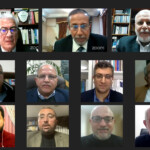
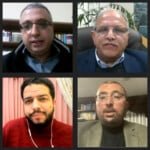
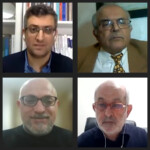
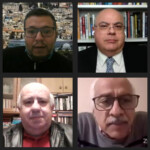
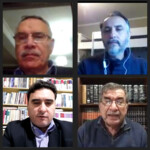

Leave A Comment